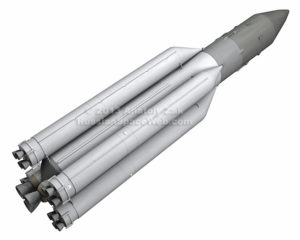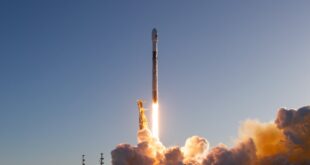
The head of the Russian Roscosmos state space corporation, Dmitry Rogozin, has approved the timetable and budget for the development of Russia’s super-heavy launch vehicle called Yenisei. It is expected that Yenisei will be developed and operational by 2028 at an overall cost of U.S.$15 billion (approximately 1 trillion rubles).
The Yenisei launch vehicle is designed to loft payloads weighing 70-80 tons into orbit, and is being developed in a bid to maintain Russian competitiveness with the United States with its SpaceX Falcon Heavy and NASA’s Space Launch System (SLS) launch vehicles, as well as the Chinese Long March 7 heavy launch vehicle that is being developed by the China Aerospace Science and Technology Corporation (CASC).
If successfully developed, Yenisei will provide Russia with a launch capability that can service deep space exploration and missions to the Moon, Mars, and other bodies in the Solar System.
RSC Energia Korolev, RCC Progress, and the Khrunichev Space Centre have been selected by Roscosmos to develop the Yenisei launch vehicle with a budget that has been capped at U.S.$15 billion through to 2028. Previous estimates had costed the Yenisei super-heavy launch vehicle development at about U.S.$22.5 billion through the same period, but Rogozin demanded reductions in this amount, no doubt trying to restore the fiduciary reputation of Roscosmos and conscious of the whiff of corruption and fraud that surrounds the organisation.
“During one of the recent sessions, the leadership of Roscosmos noted that the cost of designing and creating the first rocket should not exceed 1 trillion rubles or a bit more,” an anonymous Roscosmos source told Sputnik, a Russian news outlet. Sputnik also reports, however, that another source claims that the overall budget for the Yenisei launch vehicle has not yet been finalized.
Russian President Vladimir Putin signed a presidential decree that authorised the development of the Yenisei super-heavy launch vehicle in December 2018.
A growing number of Russian and international experts and observers, however, continue to express skepticism regarding grand and big-budget Russian space projects given the ongoing audit of Roscomos’ accounts amidst claims and accusations of corruption, fraud, and financial mismanagement, previously abandoned space projects after much political and public fanfare, and Russia’s economic situation as the country continues to be subject to international sanctions and reliance on volatile energy markets for the preponderance of its economic income.
Furthermore, there is the ongoing problem of coping with decaying space infrastructure and industrial base, with low wages and quality control issues across the Russian space sector compounded by a continuing ‘brain drain’ of Russian talent abroad.
 SpaceWatch.Global An independent perspective on space
SpaceWatch.Global An independent perspective on space




